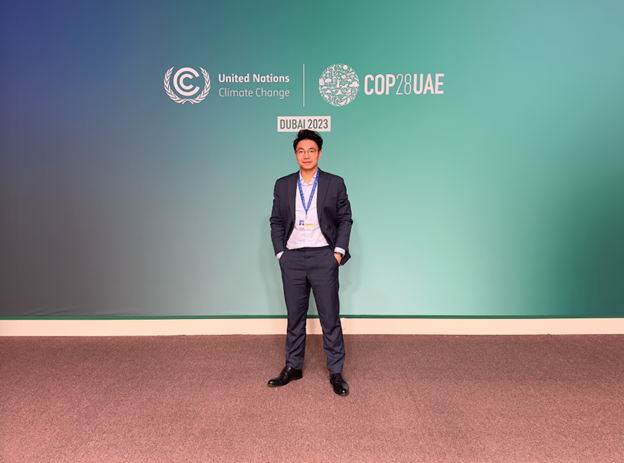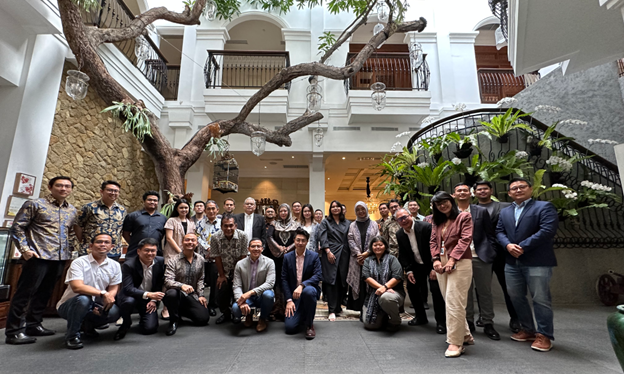Founder, Good City Foundation & Fellow, World Economic Forum
Non-profit Organization Management
Andre Kwok (MPP 2021) is a social entrepreneur, and the winner of NUS’s Outstanding Young Alumni Award in 2023. Discover how he's defined success by seeking joy in his work and lifting others up through the Good City Foundation, an NGO that empowers emerging city leaders to overcome urban development hurdles
 Andre at COP28 UAE, where he hosted the Hong Kong Climate Day.
Andre at COP28 UAE, where he hosted the Hong Kong Climate Day.When I first heard that I was being nominated for the Outstanding Young Alumni Award, I felt honoured, and frankly, a bit overwhelmed that my work as a social entrepreneur was being recognised in this way. The award meant a lot to me—in fact, my mother accompanied me to the awards ceremony in Singapore and it was meaningful to her too, because it proved that her trust in her son had paid off.
What does it mean to be ‘outstanding?’ Among my peers, there are stories of overnight success, especially with tech entrepreneurs becoming millionaires or billionaires after they secure substantial funding and list their companies on the stock market. But for social entrepreneurs like myself, it can be hard to measure or quantify our impact in immediate money terms, and it can feel like a marathon with evolving goals.
What does it mean to be ‘outstanding?’ Among my peers, there are stories of overnight success, especially with tech entrepreneurs becoming millionaires or billionaires after they secure substantial funding and list their companies on the stock market. But for social entrepreneurs like myself, it can be hard to measure or quantify our impact in immediate money terms, and it can feel like a marathon with evolving goals.
To anyone in a similar position, I would say that perseverance is essential, as well as a firm belief in the purpose of our work. At the same time, don’t be too stubborn. We should keep reflecting on our objectives and strategies, and remain open to change.
I’m reminded of my first social project, which I took on as an undergraduate student in Hong Kong. Together with my teammates, we raised money and collected recycled bottles to make simple shoes for rural dwellers in Cambodia. We even rallied some classmates and flew to Cambodia, but when we arrived at a village, we realised that people did have shoes—they just didn’t wear them in the slum areas, because the weather is humid and it’s more convenient to go barefoot. That’s a clear example of thinking we perceived a problem, and it turns out we dedicated efforts and resources in the wrong direction.
After our reality check, we spent a lot of time cold calling NGOs and knocking on doors to understand the issues on the ground. We learned that the locals were most concerned about basic needs like their water and electricity supply, as well as the state of their health. Our project turned into a needs assessment exercise, which was much more valuable than if we’d persisted with our initial idea.
Now, whenever I embark on a new venture, I make sure that we’re asking these questions: Do we fully understand the issues? And are we getting to the right starting point?
Building Better Cities Andre (front row, 4th from right) with investment and business leaders from Indonesia and the West Java Government.
Andre (front row, 4th from right) with investment and business leaders from Indonesia and the West Java Government.Together with some ex-schoolmates, I started the Good City Foundation in 2016. Our aim is to bolster the capacity of city leaders and technology ventures through public-private collaboration in Southeast Asia, with a special focus on emerging countries such as Indonesia and the Philippines. One city that we’ve been working closely with is Bandung in West Java, Indonesia, where the goal is to digitalise its smaller community banks.
Although they have a roadmap for digital transformation, the local government needed help to identify the right technology at the right cost, and that’s where Good City Foundation was able to pitch in. We had previously helped to develop a promising fintech service from the Philippines, and we decided to pilot this service in Bandung, through a joint venture effort with the government and selected local banks.
It’s a complex project, so we needed precise guidance from the local authorities to identify starting points, particularly on regulatory compliance and market entry challenges. While Filipino and Indonesian consumer behaviours are similar, introducing ground-breaking technology to the grassroots level in villages is a significant task. It involves fostering within both young and older generations the motivation to adopt digital transactions, such as using QR codes instead of queuing at banks, and opting for digital payments over cash. It's not just about setting up these habits, but also making the community aware that digital finance could aid them in other areas like e-commerce. Building trust and adaptability to change demands considerable effort, and these will be our key success indicators.
Coming from Hong Kong, our team couldn’t just arrive on the scene and proclaim, “Hey, this is a great tech solution!” To facilitate a smoother transition, we collaborated with young local civil servants to help the Bandung community feel more at ease with the idea of using unfamiliar technology.
At the same time, the local leaders value our contributions as social entrepreneurs, recognising our deeper understanding and practical experience in public policy, public administration, and technology-driven business. Unlike the global-scale consulting firms, we don’t charge sky-high fees—the leaders know that we are just as committed to engaging with the community and offering our expertise on how to effectively get things done.
Bridging Two WorldsAlthough I’ve been a social entrepreneur for most of my career, I’ve recently taken on a new role as Chief of Staff for Tsangs Group, a single family office in Hong Kong that has been funding our work at Good City Foundation since 2019. I assist with their business and investment operations in Hong Kong, and I occasionally travel to the Middle East to explore investment opportunities in areas like renewable energy, AI, robotics, and other sustainability industries.
It’s been a pivotal experience as I’ve had to shift my perspective. In nonprofits, people speak of empathy, having a social mindset, and understanding needs. But in the financial world, it’s about black-and-white numbers rather than good faith. I see this as a training ground, where I’m looking at new projects every day and asking new questions: How do we view the project owners and their relationships? Is this a viable project, or is it hype?
My experience serving a business family in Hong Kong has provided an exponential exposure and a unique fast-track for enhancing my investment acumen, while continuing to sharpen my insight into impactful business practices. What hasn’t changed though are my core motivations: a desire to see the world, do work that speaks to the heart, and uphold the values of honesty, diligence, and entrepreneurship taught by my parents. This is what I live by, and how I’ll continue to serve real needs and make an impact in this world.
More info about Andre and his Good City Foundation can be found in another LKYSPP Alumni Story that featured him in 2022: https://lkyspp.nus.edu.sg/our-people/alumni/our-alumni/alumni-stories/detail/asking-the-right-questions-to-serve-real-needs.